#Kevin Puts
Explore tagged Tumblr posts
Text
Operablr Pride Month 2024 Week #3 (June 15-21)
Can't believe we're already halfway through the month!!
Erismena (Cavalli/Aureli) Keywords: Baroque opera, trouser roles, sapphic, GNC character, genderbending, Italian opera
The Hours (Puts/Pierce) Keywords: Opera in English, historical opera, lesbians, queer characters
Lucio Silla (Mozart/Gamerra) Keywords: Italian opera, trouser roles, sapphic, MLM, poly, opera seria
Summaries, libretti, recommended productions, and more under the line! (Disclaimer: I have not necessarily seen all the productions recommended here. Most of them are those that have been recommended to me.)
Erismena
Libretto: (Another obscure one I can't find!) Summary: Starts on page 7 of this PDF Productions: Aix 2017 (English subs) Opera on Video search link: Erismena Cavalli - Opera on Video Bonus: We have a lot of Cavalli this year! Some info on "the most important Italian composer of opera in the mid-17th century." And here! Francesco Cavalli | Opera World (opera-world.net)
The Hours
Libretto: (too new. Not having luck with libretti this year lol) Summary: Metropolitan Opera | The Hours (metopera.org) Productions: Can find on Met on Demand or on VK Bonus: 2024 performance program!
Lucio Silla
Libretto: Lucio Silla Libretto | Mozart | Opera-Arias.com (Italian-translate enabled) Summary: Lucio Silla - Wikipedia Productions: Salzburg 2006 (English subs) Part 1 Part 2 Opera on Video search link: Lucio Silla Mozart - Opera on Video Bonus: Not as clement as our fave Tito perhaps but this guy sure led an interesting life: Sulla - Wikipedia
#Operablr Pride Month 2024#opera#opera tag#Erismena#Francesco Cavalli#Aurelio Aureli#The Hours#Kevin Puts#Greg Pierce#Lucio Silla#Wolfgang Amadeus Mozart#Giovanni de Gamerra#baroque opera#modern opera#opera seria
8 notes
·
View notes
Text

Currently Playing
Renée Fleming Yannick Nézet-Séguin VOICE OF NATURE - THE ANTHROPOCENE
Works by: Caroline Shaw, Gabriel Fauré, Nico Muhly, Franz Liszt, Edvard Grieg, Reynaldo Hahn, and Kevin Puts
#Caroline Shaw#Edvard Grieg#Franz Liszt#Gabriel Fauré#Kevin Puts#Nico Muhly#Renée Fleming#Reynaldo Hahn#Yannick Nézet-Séguin#playing
2 notes
·
View notes
Text
Asian Conductors
Asian conductors have made significant contributions in the classical music world for many years. Kent Nagano and Tadaaki Otawa (Japan) and Myung-Whun Chung (South Korea) among others. In this edition of In Conversation we look at two titans of the classical stage whose impact has been immense for close on fifty years. However, a new generation of talent is immerging so we pick two conductors who…

View On WordPress
#Cecile Licad#Classical Music#George Gershwin#Gerard Salonga#Gustav Holst#Kevin Puts#New York Philharmonic#Orchestre de Paris#Paul Archibald#Peter Tchaikovsky#Phil Whelan#Philadelphia Orchestra#RTHK Radio 3#Seiji Ozawa#South Denmark Philharmonic#Symphony No 4#The Planets#Time For Three#Variations on I Got Rhythm#Xian Zhang#Zubin Mehta
0 notes
Text
there's something very funny about wymack recruiting neil and seeing him as this jumpy, cagey asf kid with alarmingly absent parents and then watching him befriend the monsters, speak three languages, start fights with riko moriyama, be incredibly apathetic to violence, join the perfect court and reveal that he uses alcohol as pain reliever because it's too dangerous for him to go to a hospital, unite the team and fall in love with wymack's other problem child, all for him to turn out to be the son of kengo moriyama's right hand man.
#AND TO ALSO PUT TOGETHER THAT NEIL HAS KNOWN ABOUT KEVIN BEING HIS SON FOR MONTHS#you know he had to be like shit#no more mafia kids#how many of you are there#aftg#neil josten#nathaniel wesninski#david wymack
3K notes
·
View notes
Text
andrew handpicks robin for the foxes and robin becomes the last official member of the monsters and andrew gives robin his bed and robin sits with andrew and neil on the couch and andrew gives robin his knives and nicky leaves robin a key to the columbia house and robin becomes neil's best friend in neil's fifth year and wymack makes robin vice-captain then captain

#my posts#my aftg posts#aftg#all for the game#the foxhole court#robin cross#tfc#aftg extra content#the sunshine court#if you don't know about her you are missing out#andrew basically strongarms her into growing a spine#they put her back together as a person and also helped her as a player#she joins andrew and neil's night practices#please i'm so sad that we never get to meet her#IM SO SAD THAT KEVIN NEVER GETS TO MEET HER#or he probably does but you know what i mean
2K notes
·
View notes
Text
i need jean to pick neil up. imagine, neil is being annoying and talking shit and jean just,,,,he just picks him up, maybe swings him left and right a bit lol and neil is just hanging there confused while andrew and kevin are dying in the background
#i am once again BEGGING for someone to just pick him up#i want to do it myself so bad#put him in air jail#neil josten#jean moreau#kevin day#andrew minyard#aftg#all for the game#the foxhole court#the sunshine court#andreilscat
1K notes
·
View notes
Link
Ópera completa com legenda em português do MET.
1. Crie login gratuito no site https://www.metopera.org/
2. Instale o programa “Bigasoft Video Downloader Pro” Ele permite download do Metropolitan Opera, inclusive de cada legenda em formato SRT automaticamente.
3. Seriais Vá ao menu “Ajuda” - “Registrar” e digite um serial no campo “Código de Licença”.
4. Adicione no programa Bigasoft um destes 2 links para fazer o download. Ao usar a opção https://ondemand.metopera.org, o Bigasoft solicitará em janela pop-up que você digite seu login/senha do site do MET. https://ondemand.metopera.org/performance/detail/402d2581-1c77-53ab-ba38-004c1f885ddb https://www.metopera.org/season/on-demand/opera/?upc=810004202955
Ópera baseada no livro de Michael Cunningham e no filme de 2002. Comissionada por “Metropolitan Opera” e “The Philadelphia Orchestra”.
Poderosa história sobre três mulheres de diferentes épocas que lutam com seus demônios internos e seus papéis na sociedade. Três mulheres que estão ligadas pela obra-prima seminal de Woolf - uma que o está escrevendo, outra que o está lendo e uma terceira que aparentemente está vivendo sua trama.
O cenário tripartite desta ópera é um aspecto essencial de sua história. O primeiro local é Richmond, um subúrbio tranquilo de Londres onde Virginia Woolf viveu com seu marido, Leonard, enquanto escrevia Mrs. Dalloway em 1923. O segundo cenário é Los Angeles em 1949, onde Dan e Laura Brown estão lutando para se conformar com uma vida suburbana americana adequada em meados do século. O terceiro cenário é Manhattan, no final do século 20, onde Clarissa Vaughan se prepara para dar uma festa para o poeta Richard, que enfrenta os últimos estágios da AIDS.
The MET: Quando Philip Glass compôs a partitura para a versão em filme de The Hours, ele escolheu enquadrar as três histórias com a mesma linguagem musical, mas parece que você adotou uma abordagem diferente.
Compositor Kevin Puts: Inicialmente, eu não tinha certeza de quão abertamente eu queria estabelecer os três períodos de tempo diferentes, mas isso acabou acontecendo naturalmente. A música da Virgínia tem uma qualidade muito sobressalente, quase barroca, com a harmonia sempre se subvertendo de formas que você não espera. Eu queria que a sensação de instabilidade em sua música refletisse a complexidade de sua mente e os caminhos imprevisíveis que ela percorre em sua escrita. Então para Clarissa, que está em Nova York nos anos 90, a música tem uma vibração urbana, talvez com raízes em alguns dos compositores americanos pós-minimalistas que eu amo. Mas para Laura, que se sente presa em uma vida que não é autêntica, eu queria, ao invés disso, retratar um ambiente - esta suposta felicidade doméstica suburbana - que é estranho a ela. Portanto, ela tem um brilho inspirado na música daquela época. Com o tempo, as três começam a cantar juntas, culminando em um trio final no qual finalmente se descobrem fora da realidade.
Diretor Phelim McDermott concebeu uma série de pequenas salas que flutuam dentro e fora do palco, fazendo uma transição perfeita de um período para outro - ao mesmo tempo em que também permite que várias histórias sejam reproduzidas simultaneamente. "Musicalmente, você pode ouvir os mundos se confrontando uns com os outros", diz ele. "Quando um entra em foco, o outro está desaparecendo e ecoando, ou ainda está presente como um sonho na mente de outra pessoa. E as peças do cenário funcionarão da mesma maneira. Muito da história é sobre a vida interna destas mulheres, suas paisagens emocionais internas, então a dança que a coreógrafa Annie-B Parson está criando é como o clima emocional de uma cena, acrescentando uma metáfora visual ao que a música está fazendo".
"Sempre tive a convicção de que uma ópera deve ser escrita apenas quando precisa ser cantada - a emoção é tão grande que falar não é suficiente. E é exatamente isso que temos aqui. Apesar de lidar com a morte de frente, na verdade ela é uma afirmação de vida e conta uma história intemporal. As lutas dos personagens são compartilhadas universalmente, e destacando-as através das diferentes personalidades e períodos, todos os que assistem a ela serão capazes de encontrar uma parte de si mesmos na história". - Joyce DiDonato
Regente: Yannick Nézet-Séguin Elenco: - Clarissa Vaughan: Renée Fleming - Laura Brown: Kelli O'Hara - Virginia Woolf: Joyce DiDonato
- Wikipedia desta ópera - Informações sobre esta produção - Sinopse desta ópera - Programa de 10/dezembro/2022 - The Hours Met Talk - Time Traveler - In Their Own Time - Sobre a ópera The Hours - Virginia Woolf & The Hours - New York Public Library, 09/novembro/2022 - Review - livro “As Horas”
Personagens Principais - Clarissa Vaughan: editora de livros em Nova York em 1999. - Virginia Woolf: autora do livro Sra. Dalloway, na Inglaterra em 1923. - Laura Brown: dona de casa e mãe, em Los Angeles em 1949. - Richard: o amigo de Clarissa.
Sinopse A ópera se realiza em um único dia. Clarissa está na cidade de Nova York em 1999. Virgínia está em Richmond, Inglaterra, em 1923. Laura está em Los Angeles, em 1949.
Ato I O coro, representando os pensamentos de Virgínia, mexe com a frase de abertura do romance em que ela está trabalhando, Mrs. Dalloway.
Clarissa e sua parceira Sally estão preparando seu apartamento em West Village para a festa de hoje celebrando o melhor amigo de Clarissa, Richard, um escritor que está morrendo de AIDS. Sally duvida que Richard esteja bem o suficiente para comparecer, mas Clarissa se recusa a aceitar o péssimo estado de saúde de Richard.
Clarissa, evitando a ansiedade em relação ao Richard, parte para comprar flores para a festa. Ela se encanta com as maravilhas da Praça Washington e fica intrigada com o canto do outro mundo do Homem Sob o Arco. Ela se encontra com Walter, um escritor que compartilha as dúvidas de Sally sobre se Richard estará bem o suficiente para sua festa.
Virginia Woolf acaba de acordar e entrar em seu estúdio, ansiosa para começar seu novo romance. Enquanto observa seu marido, Leonard edita rascunhos, ela reflete sobre os muitos papéis que ele desempenha em sua vida.
Clarissa entra na floricultura e Barbara, a florista, a cumprimenta com um beijo. Clarissa escapa para uma fantasia momentânea na qual Barbara é sua amante e elas nunca têm que sair da loja. Ela encontra as flores perfeitas e sai em busca de Richard.
Em seu estúdio, Virgínia acha difícil começar a trabalhar em seu romance. Ela se distrai com os pensamentos de Londres e sua agitação, contrastando estas visões com os subúrbios sem vida de Richmond. Apesar de seus receios de sucumbir à depressão, ela começa a escrever, e ela flui.
Em sua cama em Los Angeles, Laura Brown está lendo Mrs. Dalloway que Virginia está escrevendo. Laura teme enfrentar seus deveres de esposa e mãe, já que hoje é o aniversário de seu marido Dan e seu jovem filho Richie está esperando por ela lá embaixo. Ela se afasta de sua ansiedade, voltando para Mrs. Dalloway.
Laura entra em sua cozinha para encontrar seu enérgico marido Dan e seu filho Richie de seis anos preocupado com ela. Ela tenta convencê-los de que está bem, mas internamente agoniza sobre seus medos e inseguranças. Dan, inconsciente da gravidade das lutas dela, sai para o trabalho.
Clarissa está irritada com as dúvidas de Sally sobre a saúde de Richard e se pergunta se Sally é a melhor opção para ela. Virginia percebe que uma personagem de seu romance deve morrer, mas não tem certeza de quem. Laura se debate com a tarefa de fazer um bolo de aniversário com Richie enquanto controla sua ansiedade.
A caminho da casa de Richard, Clarissa pára na esquina onde, anos atrás, ela terminou a relação romântica nascente deles, rompendo-a usando uma frase cruel que ela agora lamenta. Ela reflete sobre como uma frase pode mudar o curso de uma vida.
Clarissa chega ao apartamento de Richard para se certificar de que ele se lembre da festa. Richard, frágil e esquecido, diz a ela que não consegue encarar a festa, mas ela se atira a ele, dizendo-lhe que ele precisa se esforçar mais. Ele releva a ela que às vezes ele ainda os imagina como amantes.
Na cozinha de Laura, sua ansiedade aumenta quando ela tenta assar o bolo com Richie. Virginia pergunta a sua cozinheira, Nelly, se ela acredita que uma jovem mulher poderia começar o dia alegremente e depois decidir se matar. Isto leva Virginia a uma fantasia suicida que prefigura a forma como ela acabará por terminar sua própria vida.
Kitty, vizinha de Laura, visita e diz a Laura que talvez esteja com câncer. Laura escapa para uma fantasia romântica sobre Kitty. Ao sair dela, ela se vê beijando Kitty enquanto ela a consola. Virgínia, muito ansiosa para escrever, decide ir para o mundo.
Clarissa volta para casa para encontrar Sally ocupada preparando a festa, concentrada em preocupações práticas sobre os assentos. Clarissa tem a sensação de que algo está terrivelmente errado com Richard e volta para o apartamento dele. Virgínia, tomada pela necessidade de fugir, não sabe se deve pegar o trem para Londres ou terminar sua vida no rio. Laura sente uma necessidade desesperada de fugir de sua sufocante vida doméstica e deixa Richie com a babá, dirigindo em direção a Pasadena, sem saber onde ela vai parar. As três mulheres estão unidas em sua necessidade de escapar e em seu terror pelo que podem encontrar.
Ato II Laura se vê em uma cama em um quarto de hotel, com um frasco de comprimidos e o livro Mrs. Dalloway. Ela não sabe porque está ali ou o que fará agora: matar-se ou ler o livro. Ela tenta se recompor na última hora, lembrando-se de uma interação surreal com a recepcionista do hotel.
Laura lê Mrs. Dalloway, conjurando Virgínia, que é vista se aproximando do rio - talvez para se matar? Laura também contempla o suicídio. Virginia está momentaneamente distraída pela voz do Homem Sob o Arco. Leonard chega e diz à Virgínia que estava convencido de que desta vez a encontraria morta, e que teria que dizer à irmã dela, Vanessa, que ele havia falhado. Virgínia está comovida com a profundidade da preocupação dele.
Clarissa está voltando para a casa de Richard quando escuta um ensaio de coro de igreja. A letra deles parece escrita para ela. Fora do apartamento de Richard, ela encontra Louis, o ex-namorado de Richard, que está debatendo se deve ou não visitá-lo. Ele recorda o verão que os três passaram em Wellfleet, desencadeando um flashback retratando a delirante proximidade que Clarissa e Richard uma vez tiveram, uma proximidade que excluía Louis.
Virginia, de volta ao seu estúdio, ouve vozes de crianças e se pergunta se ela está perdendo a cabeça. Ela vai ao seu jardim para encontrar sua irmã Vanessa e seus três filhos realizando um funeral para um pássaro moribundo. Quando Virginia faz maniacamente uma sepultura para o pássaro, Vanessa percebe a gravidade da doença de sua irmã. No quarto do hotel, Laura se castiga por considerar suicídio quando tem um filho pequeno e outro a caminho. Ela está determinada a permanecer viva e a enfrentar seus deveres maternais.
Clarissa entra no apartamento de Richard para encontrá-lo em pé no parapeito de sua janela. Ela está aterrorizada, mas ele parece finalmente estar em paz. Enquanto ela tenta convencê-lo a desistir, ele explica que tudo o que ele queria era escrever algo bom, algo que pudesse tocar alguém. Ele diz a Clarissa que a ama e salta pela janela, caindo para sua morte na rua abaixo.
Enquanto Clarissa corre para o corpo quebrado de Richard, o coro incorpora o curto-circuito psíquico dela, remontando imagens e palavras do dia. Laura se recompõe para deixar o hotel e dirige pela via expressa de Pasadena. Virginia, no túmulo do pássaro, percebe que sua sanidade está se esvaindo. Todas as três mulheres parecem estar se afogando.
Laura pega o Richie na casa da babá, a Sra. Latch. Richie diz a sua mãe que estava com medo de que ela tivesse desaparecido porque ela tinha algo "crescendo dentro dela", que foi o que ele ouviu Kitty dizer. Na mesa de jantar de Woolf, Virginia agradece a Leonard pela felicidade que ele lhe deu. Dan volta para casa para comemorar seu aniversário e expressa o quanto sua família o fez feliz. Os amigos de Richard se reúnem em sua festa, agora um velório. Sally tenta convencer Clarissa de que ela fez tudo o que podia por ele. Clarissa percebe que sua falha em reconhecer o terrível estado físico e mental de Richard pode ter contribuído para sua morte. A mãe de Richard, Laura, chega à festa e tenta expressar pesar por seus fracassos como mãe.
Enquanto os outros recuam, Clarissa, Laura e Virginia se encontram em um espaço que transcende o tempo e o lugar, onde finalmente podem se perceber. Elas se espantam de que o tempo todo, enquanto viajavam por seus dias sentindo-se sozinhas, havia outras que sentiam o mesmo, influenciando e sendo influenciadas por outras de maneiras que elas não conseguiam entender.
youtube
youtube

1 note
·
View note
Text
kevin day is the most insufferable obnoxious cunt ive ever seen and i love him so much
#when he was yapping abt how jean would look in different lightings i was like god shut the fuck up you beautiful bastard!!#hes so annoying i wanna kiss his forehead and put him in my pocket#good on jeremy for calling him out tho the constant resorting to violence w these boys is wild#kevin day#aftg#tsc#the golden raven#jean moreau#jeremy knox#very minor spoilers in tags
482 notes
·
View notes
Text
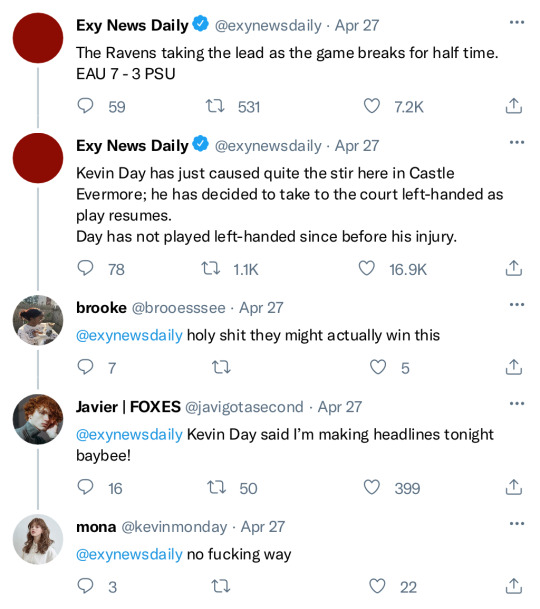
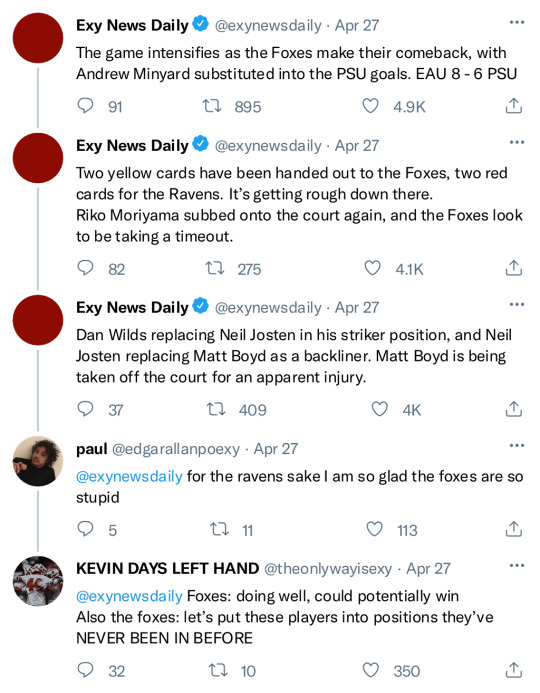
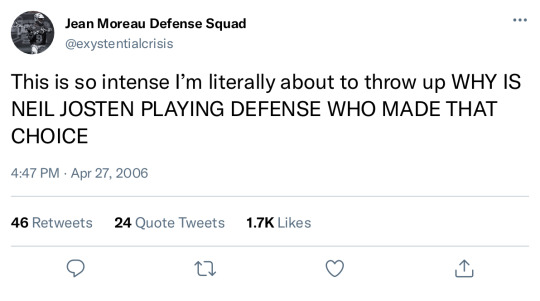

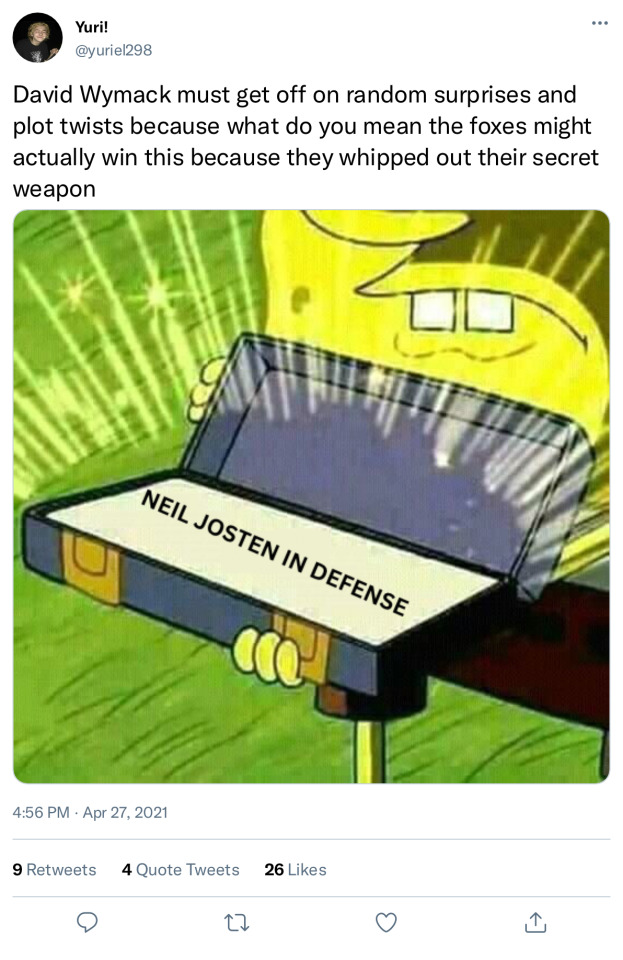

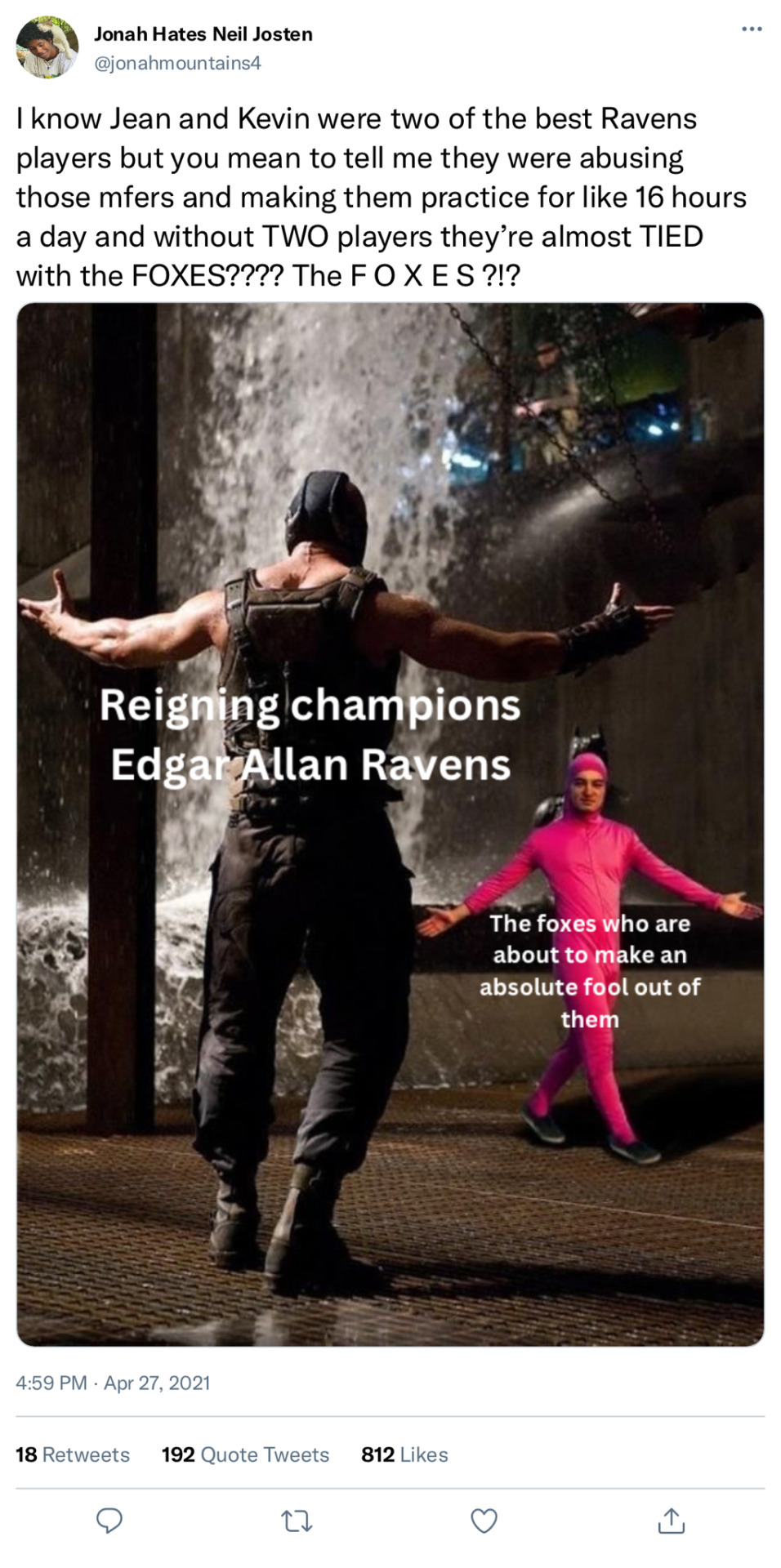

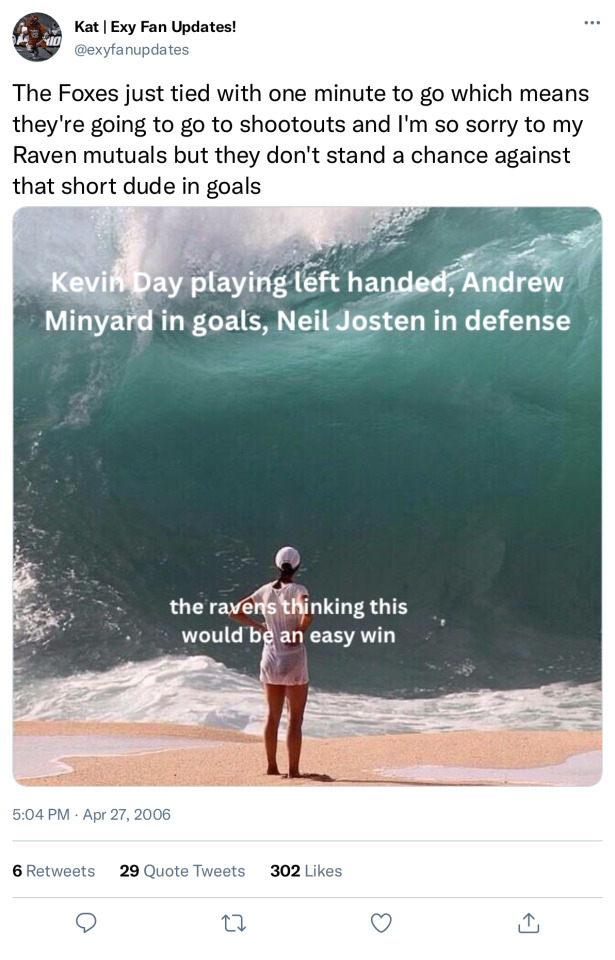

Exy fans on Twitter (championship final edition pt2)
#let’s try this again#I’m still having fun so you’re still getting em okay!#kevin day#Riko Moriyama#Neil josten#Andrew minyard#Matt boyd#aftg#tfc#all for the game#the foxhole court#in universe memes#mine#Riko arm smash HD reaction coming soon I swear#if u seen the typo no u didn’t#I wish I could put more than ten per post but alas here we are
2K notes
·
View notes
Text

Also it’s still St. Paddy’s where I am so the Irishman himself ☘️
#we joked about putting a bite mark as well#the consensus was its from one of the twinyards#although I did also like the mistletoe ideas from last Christmas#he gets nice lil kisses from everyone#Allison might commit. right on the mouth Once and never again#Andrew: no kisses but he does slap Kevin’s ass on the way by#I thought it was funny anyway 😂#oh yeah. Nicky gave him the shirt#fan art#my art#aftg#all for the game#kevin day#chibi#digital#st patricks day
1K notes
·
View notes
Text










📢🦊im going to be opening my store for AFTG merch preorders tomorrow at 12 pm PST! (oct 18th)🧡🍑
Preorders will be open for around 2 weeks, and the first 50 orders will receive a free 2 inch circle sticker :) i ship internationally! (germany customers pls DM me if u want to get something bc the process will be diff for u)
I’ll be selling new tamagotchi shakers, phone charms, stickers, and prints!!
#aftg#all for the game#all for the game fanart#aftg fanart#neil josten#andrew minyard#kevin day#andreil#merch#cheeto neil will be a sticker too but i forgor to put him in the infographic
440 notes
·
View notes
Text

yurifying kevjean because i’m a liar and have not taken a break 🚬🚬
#if anyone’s got lesbian!kevjean fics send them my way#there’s something so special about lesbians and noses caht quite put my finger on it#practicing line work cause 😔💔#digital art#all for the game#aftg fanart#aftg#kevin day#jean moreau#kevjean
363 notes
·
View notes
Text
when you show up to the jeremy knox appreciation competition but kevin day and jean moreau are already there




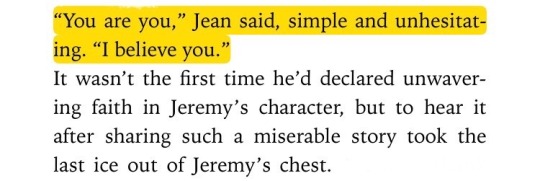
#jeremy knox#kevin's still got the top spot bec of that “you are close enough to count” line & knowing jeremy's plays by heart#but jean puts up a good fight#the golden raven#jean moreau#kevin day#the golden raven spoilers#all for the game#the sunshine court#aftg tsc#aftg
292 notes
·
View notes
Text
jean and raven!neil would have been so codependent that they redefined the word.
#they would have put kevin and rikos codependency to shame#jeaneil#all for the game#aftg#aftg headcanon#the sunshine court#tsc#tsc headcanon
2K notes
·
View notes
Note
I am OBSESSED with ur account!!! may i please request some more neil/jean to distract me while i should be packing my flat up 💖💖
IM SORRY THIS IS TOO LATE AND HAS BEEN SITTING IN MY INBOX BC I DIDNT GET AROUND IT AND I FEEL BAD FOR LETTING IT SIT HERE WHILE IM TRYING TO SLOWLY CATCH UP ON MY INBOXES SO PLEASE TAKE THIS AS A PEACE OFFERING
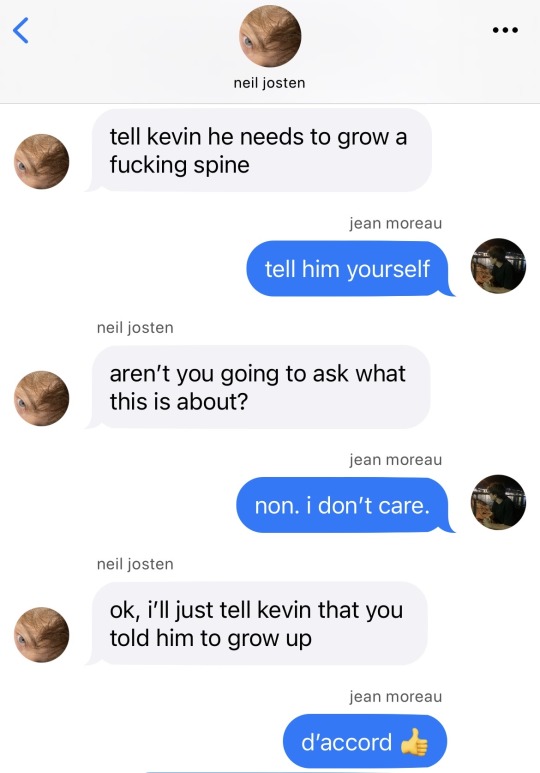
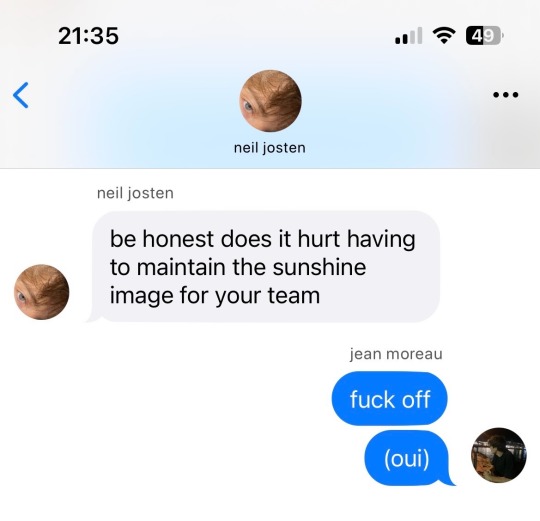
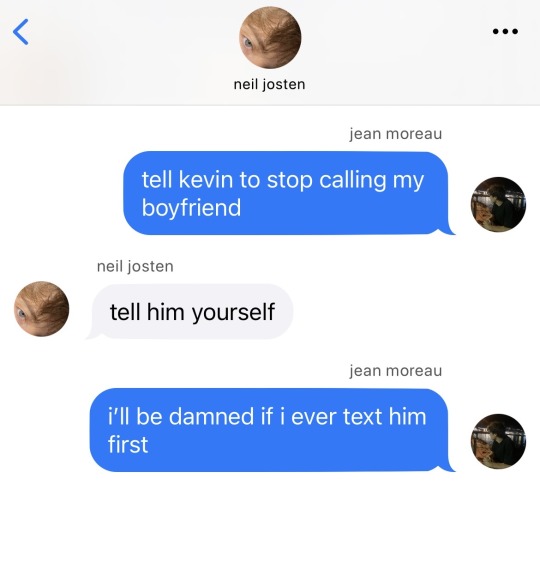
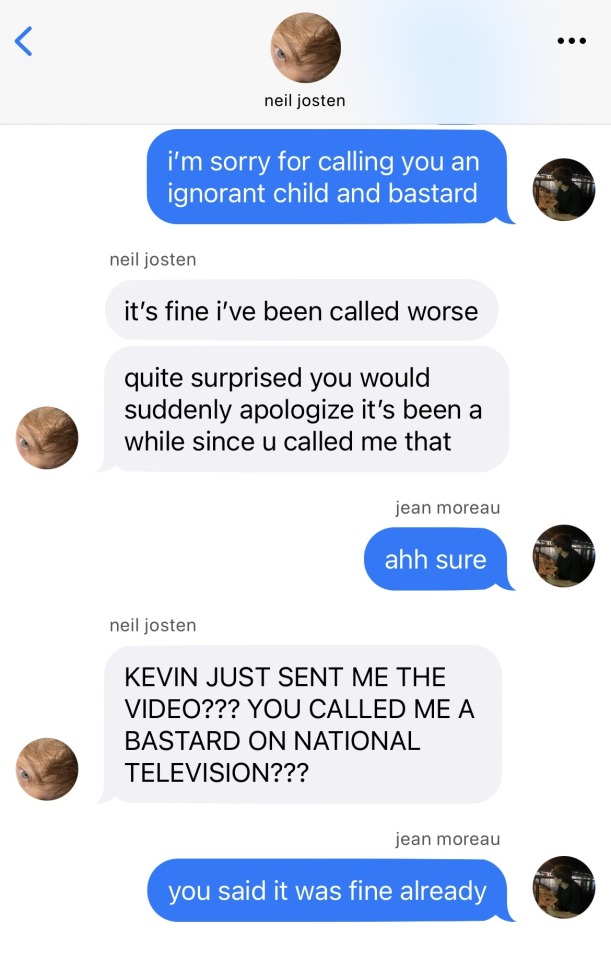
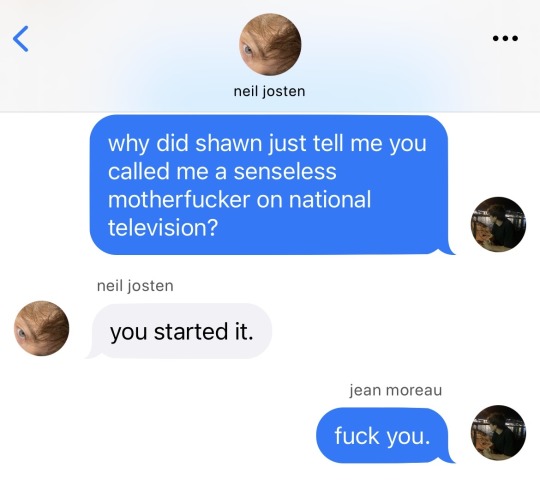
take this bonus between kevin & jean as a peace offering for the late reply :((( i hope packing up your flat went well tho!!!
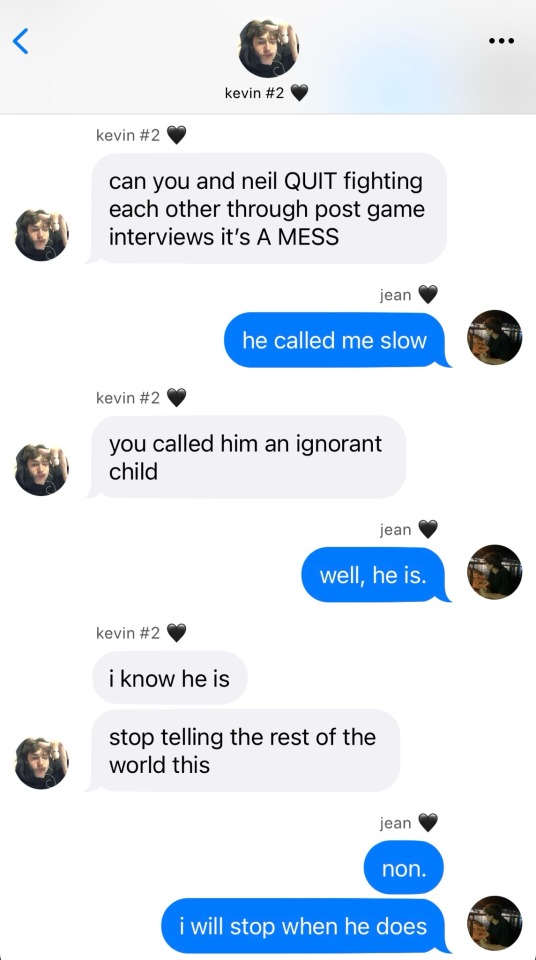
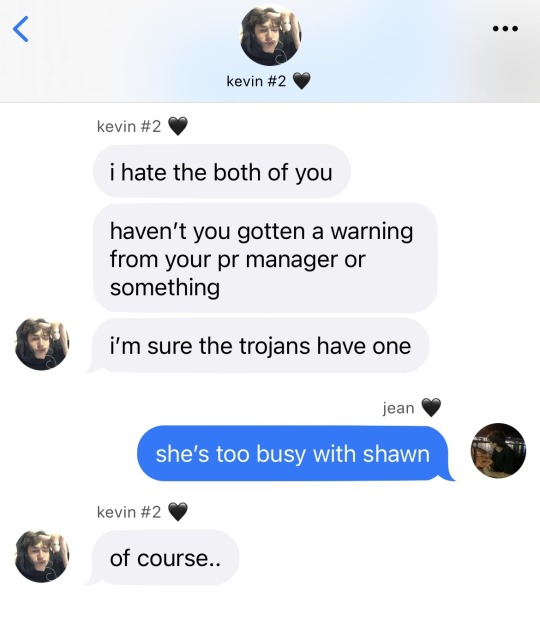
#kevinsdsy’s inbox#i fear putting this out will make everyone think they found a loophole in me ending the socmed au 🏃🏻♀️#to that all i have to say: be prepared to get really slow replies to socmed requests my inbox is a bit of a mess#i’ve been trying to catch up on my inboxes for like a month now but i fear i SUCK at doing requests sorry besties#especially bc i dont always feel inspired#anyway#neil josten#jean moreau#jeaneil#the trojans social media au#foxes social media au#all for the game social media au#kevjean#kevin day
428 notes
·
View notes
Text
the golden raven with no context




#somehow it was DIFFICULT to find a decent peach scene photo#jeremy would love being compared to style queen Elle Woods#he might wanna start reading that book though#please don’t Jean and Kevin say from a distance#poor jean thinking Xavier had had HEART SURGERY of all things 😭#Jeremy was robbed of not seeing Jean put Bryson in his place#the golden raven#the golden raven spoilers#kinda??#all for the game#aftg#aftg tgr#jean moreau#jeremy knox#jerejean
258 notes
·
View notes